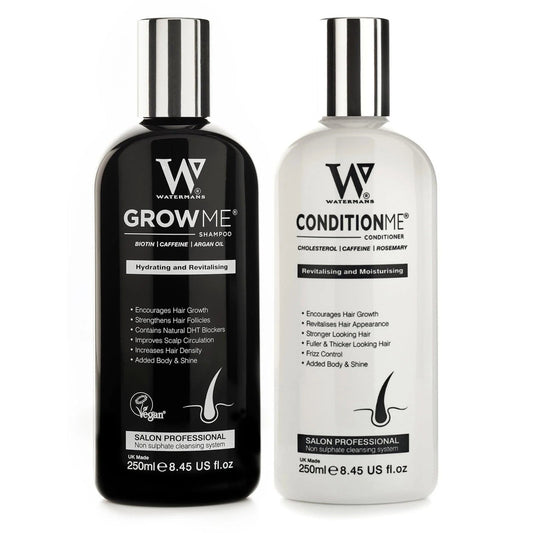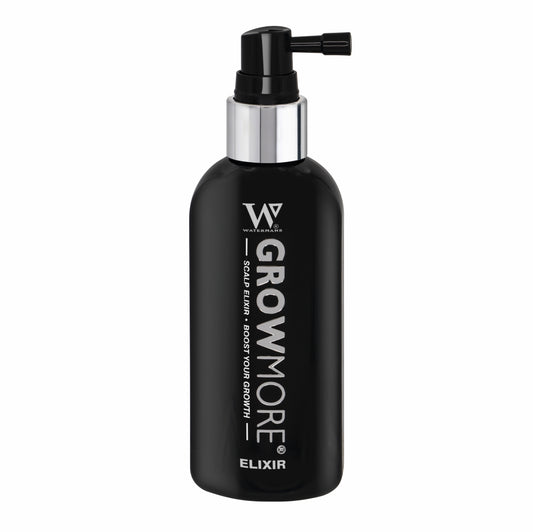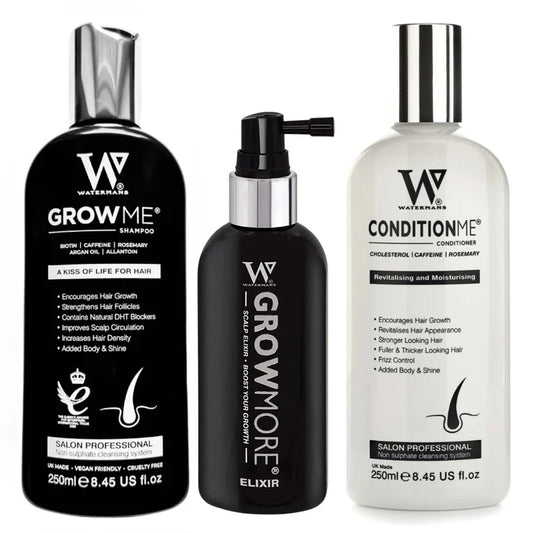Unmasking Severe Infections: Understanding Risks, Symptoms, and Effective Treatments
Share

Severe Infections: Understanding Risks, Symptoms, and Effective Treatments for Hair Loss
Severe infections can be a hidden cause behind many health issues, including hair loss. When infections become intense, they affect the entire body and can impact hair growth and scalp health. If you or someone you know is dealing with unexplained hair loss, understanding how severe infections influence hair follicles is crucial. This article dives deep into severe infections, their connection to hair loss, symptoms to watch out for, risks involved, and effective treatments to restore healthy hair.
If you’re looking for a natural, non-medical solution to help with hair regrowth, try Watermans Grow Me Shampoo. It’s packed with Biotin, Rosemary, Caffeine, Niacinamide, Argan Oil, Allantoin, and Lupin Protein—ingredients known for energizing the scalp and volumizing hair right from the roots.
What Are Severe Infections?
Severe infections are caused by harmful bacteria, viruses, or fungi that invade the body and multiply rapidly. When the immune system cannot control these microorganisms, the infection can spread and cause major health problems. These infections may lead to high fever, fatigue, and other critical symptoms, sometimes damaging the skin and scalp.
How Do Severe Infections Affect Hair Health?
Hair follicles are tiny organs in the skin responsible for growing hair. They can become inflamed or damaged during severe infections. For example, infections of the scalp such as fungal infections (tinea capitis) or bacterial infections can weaken hair follicles, leading to hair thinning or patches of hair loss.
Moreover, systemic infections—those affecting the whole body—may trigger a condition called telogen effluvium where hair prematurely enters the resting phase and falls out in larger amounts. This is the body’s way of responding to stress or illness, diverting energy to heal rather than grow hair.
Common Risks Associated With Severe Infections and Hair Loss
- Delayed treatment: Not addressing infections promptly increases the risk of permanent hair follicle damage.
- Immune system response: The body’s fight against infection can cause inflammation that harms hair follicles.
- Scalp skin damage: Ulcers or sores from infection can scar the skin, making hair regrowth difficult.
- Nutritional deficiencies: Severe infections can limit appetite and nutrient absorption, starving hair follicles of essential vitamins.
- Medication side effects: Some antibiotics and antivirals, although necessary, may cause temporary hair thinning.
Identifying Symptoms of Severe Scalp Infections
Knowing early signs helps in getting timely care and protecting hair health:
- Redness and swelling around hair roots or patches of the scalp
- Pain or tenderness when touching the scalp
- Itching or burning sensation
- Pus-filled bumps or sores
- Hair falling off in clumps or patches
- Flaking or scaly skin on the scalp
- Fever and general sickness symptoms
If you notice these signs, it’s important to consult healthcare providers promptly for diagnosis and treatment.
Types of Severe Infections That Impact Hair Growth
1. Fungal Infections (Tinea Capitis)
Tinea capitis is a contagious fungal infection that mainly affects children but can also occur in adults. It creates scaly, itchy bald patches and may cause hair to break off near the scalp. Without treatment, it can lead to permanent hair loss.
2. Bacterial Infections
Bacterial infections like folliculitis occur when bacteria infect hair follicles. This condition causes redness, pimples, and sometimes pus. Severe cases can lead to scarring alopecia, where hair follicles are destroyed.
3. Viral Infections
Certain viruses affect the scalp indirectly by causing systemic illness, leading to hair loss. For example, infections like measles or the flu can trigger telogen effluvium, causing temporary hair shedding.
4. Autoimmune Responses Triggered by Infections
Sometimes infections trigger the immune system to mistakenly attack hair follicles, resulting in alopecia areata—a form of patchy hair loss.
How Are Severe Infections Diagnosed?
Doctors may use:
- Physical scalp examination
- Microscopic analysis of hair and skin scrapings
- Cultures to identify bacteria or fungi
- Blood tests to detect systemic infections
- Biopsy in rare cases to check for follicle damage
Correct diagnosis helps choose the right treatment and protects hair health.
Effective Treatments for Severe Infections and Hair Loss
Medical Treatment for the Infection
- Antifungal shampoos and oral antifungal medications to treat fungal infections
- Antibiotics for bacterial scalp infections
- Antiviral drugs when viral infections are involved
- Anti-inflammatory medications to reduce scalp inflammation
Natural and Supportive Hair Care
Alongside medical treatments, caring for the scalp and hair with natural products can promote regrowth. That’s where Watermans Grow Me Shampoo stands out. This shampoo contains:
- Biotin: Strengthens hair and supports thicker growth
- Rosemary: Improves blood flow to the scalp, stimulating follicles
- Caffeine: Energizes hair roots and reverses hair follicle damage
- Niacinamide: Boosts scalp health and reduces inflammation
- Argan Oil: Hydrates and nourishes hair strands
- Allantoin: Soothes irritated scalp skin
- Lupin Protein: Adds strength and volume to hair
Using this natural, non-medical shampoo regularly can help restore hair vitality after infections.
Preventing Hair Loss Caused by Severe Infections
- Treat infections early: Don’t ignore symptoms and visit a doctor promptly.
- Maintain scalp hygiene: Regular gentle washing reduces infection risk.
- Avoid harsh chemicals or heat styling that irritate vulnerable scalps.
- Eat a balanced diet: Ensure adequate iron, zinc, and vitamins crucial for hair health.
- Manage stress: Stress weakens immunity and aggravates hair loss.
- Use products like Watermans Grow Me Shampoo to strengthen and protect hair.
Lifestyle Tips to Support Hair Recovery
- Stay hydrated: Water helps nutrient delivery to the scalp.
- Massage the scalp daily: This increases circulation and encourages hair growth.
- Limit use of tight hats or headgear: These can worsen scalp irritation.
- Avoid scratching: This can spread infection and cause scarring.
- Get plenty of sleep: Proper rest aids immune system recovery.
Frequently Asked Questions (Q&A)
Q1: Can severe infections cause permanent hair loss?
A1: If infections cause scarring on the scalp or destroy hair follicles, hair loss may be permanent. Early and proper treatment reduces this risk.
Q2: How long after an infection can hair grow back?
A2: Hair regrowth depends on infection severity and individual healing. Usually, hair starts regrowing within 3 to 6 months once the infection clears.
Q3: Is shampoo alone enough to treat infection-related hair loss?
A3: Shampoo like Watermans Grow Me Shampoo supports scalp health and regrowth, but medical treatment may be necessary to clear severe infections.
Q4: Can stress from infections worsen hair loss?
A4: Yes, stress triggers hair follicles to enter rest phase prematurely (telogen effluvium), increasing hair shedding during or after illness.
Q5: Are natural remedies effective for scalp infections?
A5: Natural ingredients can soothe and support hair health but do not replace doctor-prescribed medicines for severe infections.
Q6: Does poor nutrition contribute to infection-related hair loss?
A6: Absolutely. Deficiencies in protein, vitamins, and minerals weaken hair and slow recovery from infections.
Q7: Can scalp infections be contagious?
A7: Yes, fungal and bacterial scalp infections can spread through close contact or sharing hats, brushes, and pillows.
Q8: How often should I use Watermans Grow Me Shampoo for best results?
A8: For optimal scalp health and hair strengthening, use Watermans Grow Me Shampoo regularly every 2-3 days.
Q9: Are there any side effects of Watermans Grow Me Shampoo?
A9: This shampoo is natural and gentle, suitable for most people. However, patch test before full use if you have sensitive skin.
Q10: Can hair loss caused by infections come back fully?
A10: In most cases, hair can regrow fully with timely infection treatment and supportive hair care.
Did You Know?
-
Did you know severe infections can trigger hair loss conditions like telogen effluvium? This type of hair fall usually appears 2-3 months after an illness.
-
Did you know that Rosemary essential oil, found in Watermans Grow Me Shampoo, has shown promising results in improving circulation to the scalp? This helps hair follicles get more nutrients and oxygen.
-
Did you know scalp fungal infections are more common in children but adults can get them too? Proper hygiene and treatment are key to prevention.
-
Did you know Inflammation from infections releases chemicals that can weaken hair follicles leading to miniaturization and hair thinning?
-
Did you know a healthy scalp is the foundation of beautiful hair and using natural products like Watermans Grow Me Shampoo can help restore scalp balance post-infection?
Understanding severe infections and their impact on hair loss empowers you to act smartly. Combining medical treatments with scalp-friendly products like Watermans Grow Me Shampoo provides an excellent natural start for anyone seeking to protect and regrow their hair after infection-related loss. Stay informed and take action early to give your hair the best chance to thrive!



